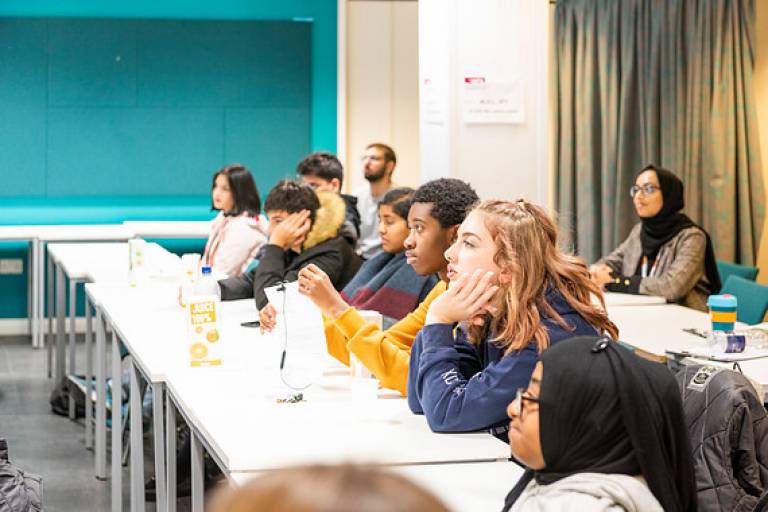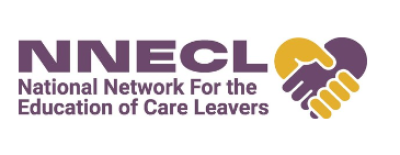UCL is committed to supporting young people in care and those who have left a care environment, and we encourage these students to apply to study at UCL and access the support available.

UCL recognises that when applying to and entering higher education, young people in care can face particular difficulties that their peers are less likely to experience. This page explains some of the activities and support that is available if you have experience of being in care.
On this page:
- What do we mean by care experienced?
- Access UCL
- Events and activities
- UCL support for care experienced students
- The UCAS application - three reasons to 'tick the box'
- Other sources of support
What do we mean by care experienced?
For the purposes of our widening participation activities, UCL defines a care experienced person as someone aged under 25 who has been looked after by a local authority for a minimum of three months (a minimum of 84 days) in their life. The months do not need to be consecutive. This includes foster care, residential care, kinship care as a formal agreement with the local authority or living at home under the supervision of the local authority.
Access UCL
Access UCL is our contextual offer scheme for applicants from some groups that are underrepresented at UCL. Access UCL eligible applicants that are successful in receiving an offer from UCL, will receive an offer that is lower than the standard entry requirements for the programme. If you are care experienced, you may be eligible for the Access UCL contextual offer scheme. Please see our webpage for further details of eligibility requirements and processes.
Events and activities
Are you in care, or have experienced some time in care when you were younger? We strongly encourage you to apply to one of our widening participation activities as we prioritise students from care experienced backgrounds, as long as they also possess the academic potential to meet UCL’s minimum entry criteria. To make sure we can identify you and give your application additional consideration, please make sure to select that you ‘are currently in care, or have been in the past'. For full details of our targeting criteria please see our Who we work with page.
Whether you want to have a taste of university life, experience a subject of interest, or learn some study skills required for higher education, then make sure you submit an application to one of our programmes. We publish all eligibility requirements on our activity pages. If you are uncertain if you meet the care experienced criteria or grade requirements, please contact Jalal Pour and Michele Sahiri at wp.pre16@ucl.ac.uk to discuss your situation. We would love to hear from you!
Additionally, we do offer some activities specifically targeted at students with experience of being in care:
Experience UCL is an exciting opportunity for year 12 or 13 students to visit UCL and learn about life as a student: you will spend a day with two current undergraduate students, go on a tour of the campus, and seek advice from members of UCL staff on topics such as applying to university, support services available and financial support. Head over to the Experience UCL webpage to see further details and access the application form.
UCL support for care experienced students
If you are applying to UCL, or currently studying at UCL, and would like to learn more about the various forms of support UCL has to offer care experienced students, then please visit our dedicated webpage.
Suzanne Hewings, Senior Student Success Officer in the UCL Student Success Office, is Student Support and Wellbeing's named first point of contact for care experienced and estranged undergraduate home students. This contact is there for students from the pre-application stage all the way through to graduation, to ensure that your journey through UCL is as smooth as possible. Suzanne is able to put you in direct contact with relevant support services at UCL. You can contact Suzanne by email.
The UCAS application - three reasons to 'tick the box'
When completing your UCAS application, you will notice that there is a question asking if you have been in care and for how long. As outlined in this blog on the UCAS website, there are three reasons why it’s a good idea to ‘tick the box’ to indicate your care experience.
Your chosen universities can connect you to the support you’re entitled to. If you have grown up in care, you are entitled to a range of practical support in higher education, if you want it. Ticking the box in the UCAS application is a quick and easy way to let your chosen universities know that you would like to know more about any additional support they can offer, and they may get in touch with the details.
Admissions staff can consider your achievements and potential in context. Universities are aware that people with experience of being in care may have had a more challenging and disruptive experience in their education than those who have not been in care. Disclosing your care experience will help admissions staff consider your achievements ‘in context’. At UCL, care experienced applicants under the age of 25 are automatically eligible for a reduced offer through our Access UCL contextual offer scheme.
The information you share about your care experience is confidential. Information about your care experience is treated confidentially and will only be shared with those who would be involved in supporting you.
It’s important to point out that your decision to tick the box will not negatively impact on a university’s decision to offer you a place. Universities want to make you aware of all the support available to you, so that you can choose to access the services that you need to ensure your experience of university is the best it can be.
Other sources of support
The below organisations also offer information and support that may be useful to care experienced students applying to university:
- Resources for Care Experienced and Estranged Students. This guide has been created by a care experienced current UCL student in collaboration with the Student Success Office.
- Become is a charitable organisation that provides support for young people in care and care experienced students.
- The Propel website can help you research the support available at different universities and colleges, and there is lots of information about going to university from care, including information about finance and funding, accommodation help, student case studies, and help with applying.
- NNECL (National Network for the Education of Care Leavers) has resources for care experienced students on its website.
- The Care Leavers’ Covenant supports young care leavers in England aged 16-25 to live independently – here you will find universities and colleges who have made a public commitment to support care leavers, career opportunities (including job vacancies, apprenticeships and internships), and other opportunities (such as discounts and careers advice).
- UCAS has a dedicated webpage with information and advice for care experienced students, including guidance on how to find out what support a particular university might be able to offer you.
SAYes Mentoring is currently looking for young people (aged 16-24) who live in London and have experience of being in care to take part in a fully-funded online mentoring programme. You can find out more details about the programme and how to apply on the SAYes website.
 Close
Close


